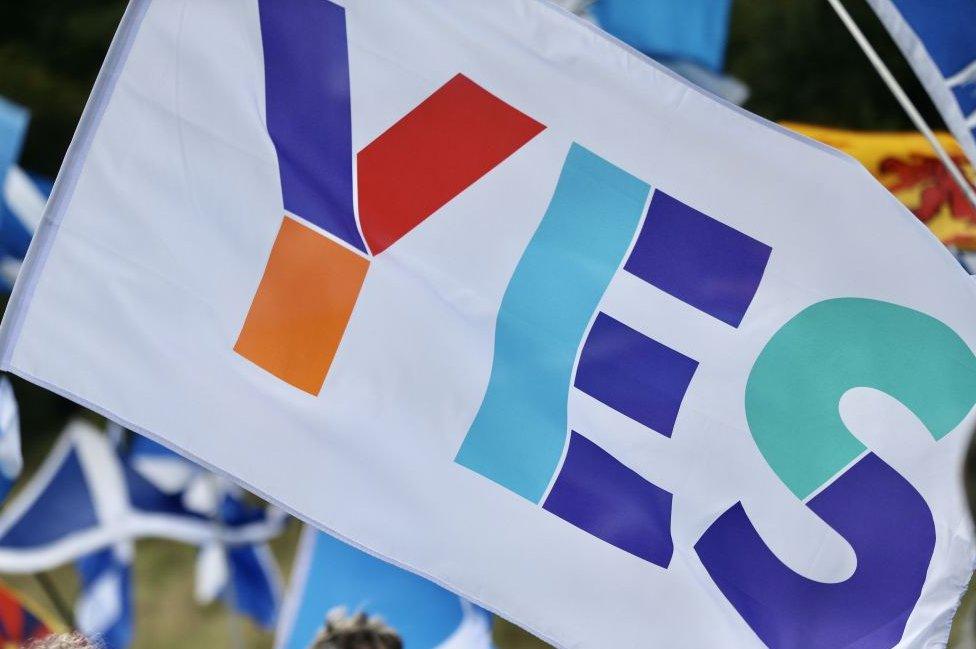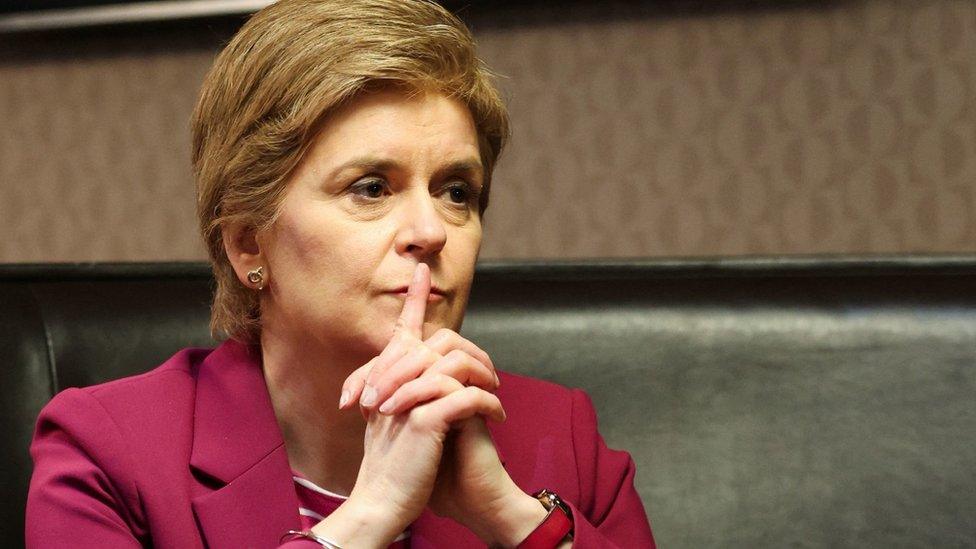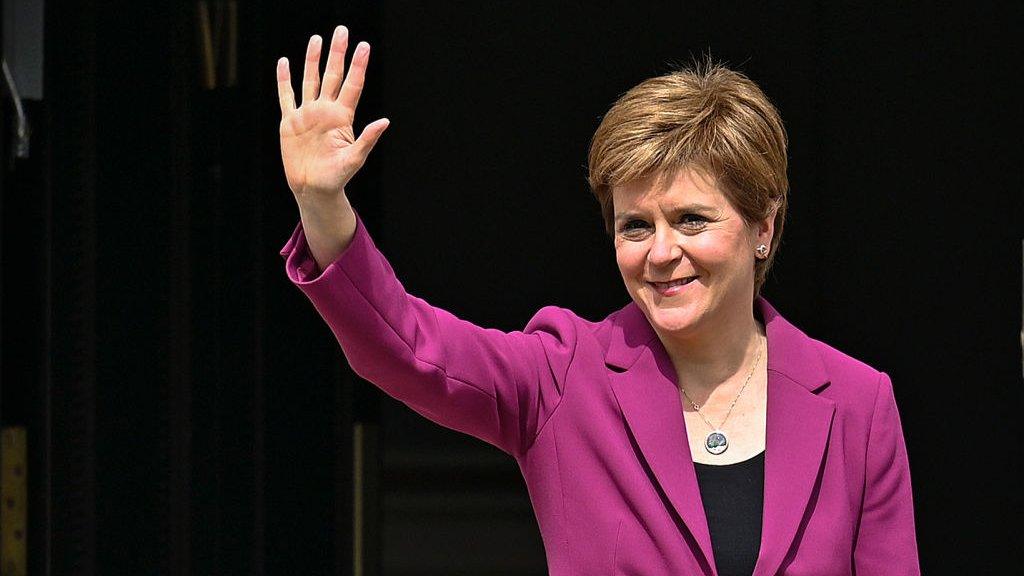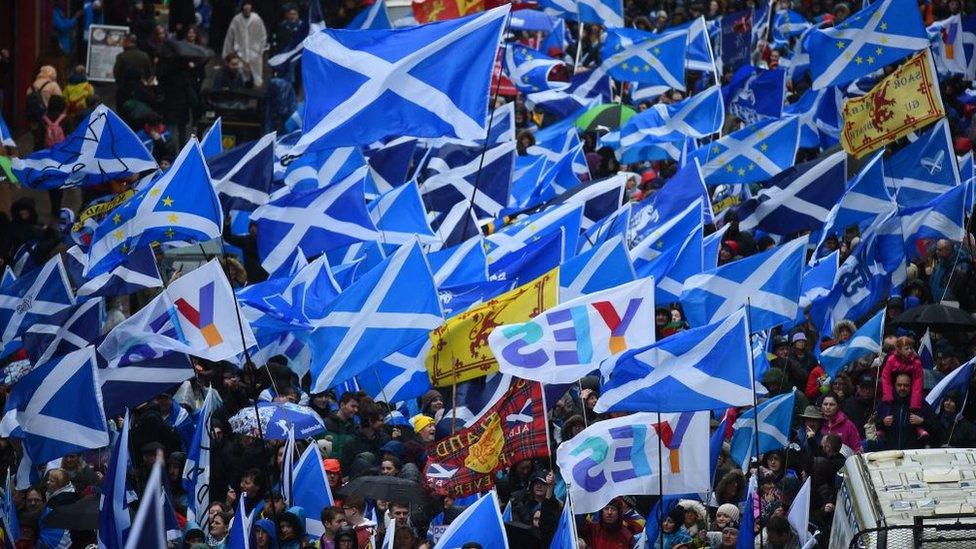Scotland 'cranking up' towards second referendum - SNP
- Published

Success at Thursday's council elections showed an appetite for a fresh vote, said Kirsten Oswald
The SNP is "cranking up" for a second independence referendum, according to its deputy Westminster leader.
Kirsten Oswald has told BBC Scotland's The Sunday Show that last week's local election results showed there was a real appetite for a fresh vote.
Party leader Nicola Sturgeon has promised a vote before by the end of 2023, but the UK government has so far refused to back the idea.
Ms Oswald said she looked forward to movement in the coming months.
The MP said: "[The election] does send us a clear signal that people have a real appetite to look to the future, and a better future that independence will bring."
She said polls suggesting the same 55%-45% Yes-No split as the 2014 referendum result did not mean the country had not moved on in eight years.
"I think it's a mistake for anybody to suggest we are stuck. The people of Scotland are entitled to their democratically-held views," she said.
She added that is was not for the Conservatives to decide if a referendum could take place.
"I think we absolutely are on the move towards a referendum and the first minister has been very clear on our position in terms of timing and what we would like to see - and we have a mandate for that as well, don't forget," she said.
"I look forward to things cranking up and I would reflect again it is absolutely not democratically possible for the Conservatives to keep suggesting that this won't happen. it is not up to them, it's up to the people of Scotland."
Success at Thursday's council elections showed an appetite for a fresh vote, said Kirsten Oswald
Last week, Nicola Sturgeon said her government was "considering carefully" whether to publish parts of the legal advice it had received over a second independence referendum after the information commissioner ruled that the details should be disclosed by 10 June.
She said the Scottish government would "put in place the mechanisms" to enable an independence referendum to take place by the end of 2023, and that preparations were under way.
And she said she had a clear mandate.
"I won an election on the basis of offering people a choice - and it is a choice," she said.
"It's for people in Scotland to decide, and therefore that democratic mandate to prepare for that is one that is beyond any question."
'Exactly where we were'
The UK government has shown no sign that it would be willing to give the formal consent that ensured the legality of the 2014 referendum.
Scottish Conservative leader Douglas Ross did not agree that last week's elections showed Scots wanted a second vote.
He told the programme: "Really the vote for pro-UK parties is at 55% and the vote for pro-separation parties is at 45%, exactly where we were eight years ago."
Douglas Ross says the local elections shows Scots do not want a second independence referendum
He blamed his party's disappointing showing at the polls on events at Westminster.
"This was a problem across the UK and we were not immune to the criticism of the prime minister and Partygate.
"Results across the UK show that the public have decided to send a protest vote, mainly by staying at home, not by switching to other parties.
'Booting Johnson out'
Scottish Labour leader Anas Sarwar warned voters against being drawn into a new independence campaign.
He told BBC Scotland: "Nicola Sturgeon is going to pretend between now and the next general election that it's Scotland versus England.
"It's not Scotland versus England. If you look at Birmingham, Liverpool, Manchester, London, Cardiff, Glasgow, Edinburgh. Right across the country, people are angry and fed up with this Conservative government. It's not Scotland versus England, it'll be Boris v Britain and Britain is going to win."
Anas Sarwar believes the next general election will be "Boris versus Britain"
He said Labour would not change its stance opposing independence.
Mr Sarwar said: "When the SNP were losing election after election, no one suggested they stop supporting independence and become a pro-UK party.
"Lots of people support the SNP because they think the UK isn't working for them.
"We have a chance of fundamentally changing the United Kingdom. And the best way of protecting the UK, of changing the UK is booting Boris Johnson out of Downing Street.


Nicola Sturgeon told the SNP conference last November that the independence campaign would "resume in earnest" as we emerge from winter into spring.
That hasn't happened yet. But we do know that a small team of civil servants are working on a revised prospectus for what an independent Scotland might look like.
The first minister has also been considering the timetable for the introduction of a referendum bill at Holyrood to enable the vote to happen before the end of 2023.
The trouble is, without UK government agreement and Westminster giving Holyrood the power to hold a referendum that is beyond legal challenge, this bill will be challenged in court.
If the Scottish government loses, the referendum won't happen. If they win, any referendum might still be boycotted by some on the pro-Union side. This could get very messy.
The only way to have a successful referendum is by agreement between the two governments but the route to securing that is far from clear.
- Published2 May 2022

- Published9 May 2021

- Published22 March 2021
